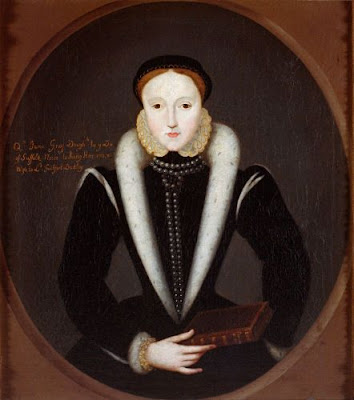26 November 2023
Book Review: Women of Power: Formidable Females of the Medieval World, by Teresa Cole
22 November 2023
Book Review: School of Aces: The RAF Training School that Won the Battle of Britain, by Alastair Goodrum
I followed my father into the Royal Air Force, and ended up teaching the theory of flight at the central training school, so I have a keen interest in the history of RAF training.
21 November 2023
Special Guest Post by Samantha Wilcoxson: Masterworks ~ Historical Short Fiction Inspired by Works of Art
Masterworks is an anthology of short stories curated by Historical Writers Forum. This is HWF’s third annual collection, and the 2023 theme is stories inspired by works of art. Eleven participating authors explored stories behind famous works, lives of artists, and even the point of view of a portrait through time.
The artwork I chose for my Masterworks story is a marble statue of Alexander Hamilton that was sculpted by Robert Ball Hughes in 1835. This statue captures Alexander as most of us envision him, in the prime of his life, handsome, and ready to take on the world – or at least Thomas Jefferson. This statue was destroyed in New York’s Great Fire of 1835 less than a year after its installation and after James, Alexander’s son, failed in his efforts to save it.
James shared his father’s intellect and passion for law and finance. His Reminiscences include pages of economic and banking advice sent to presidents and other government officials. He was a quieter man than his father, only serving as temporary Secretary of State and never grasping at a permanent cabinet position. James also was much more diplomatic. Alexander Hamilton famously said too much with excessive candor. James made friends among people with diverse political beliefs and explored Europe making favorable connections everywhere he went.
While writing this story, I was able to include some fantastic lines that are taken directly from the writing of James and his brother, John, such as, ‘Can freedom loving Americans stand before the world as a great republic that holds people in fetters while tyrants free their slaves?’ As the Civil War tore the country apart, the Hamilton brothers boldly spoke out against slavery and in favor of abolition.
This story not only shines a light on James, but also on the era between the American Revolution and Civil War, which I hope causes readers to contemplate how much more complicated of a task it was to form a new nation and compromise on laws and issues that seem non-negotiable to us. As James thinks to himself in my story, ‘It had seemed reasonable to them to leave some problems for their sons to solve. And so here I am.’ Instead of accusing historical figures of failing, perhaps we should be more willing to do our own part in the present.
Stories in this anthology take place throughout history, from ancient Mesopotamia to the 20th century, and feature interesting characters related to diverse works of art. Readers can get these stories and maybe find their next favorite author for only .99 on Kindle or free with Kindle Unlimited.
Samantha Wilcoxson is an author of emotive biographical fiction and strives to help readers connect with history's unsung heroes. Her historical fiction novels include the Plantagenet Embers series, Luminous: The Story of a Radium Girl, and But One Life, a novel of Nathan Hale. Saantha also writes nonfiction for Pen & Sword History. Her most recent work is Women of the American Revolution, which explores the lives of 18th century women, and she is currently working on a biography of James Alexander Hamilton. Samantha loves sharing trips to historic places with her family and spending time by the lake with a glass of wine. Find out more at Samantha's Blog https://samanthawilcoxson.blogspot.com/ and find her on Facebook and Twitter/X @carpe_librum
20 November 2023
Book Review of Uncrowned: Royal Heirs Who Didn't Take the Throne, by Ashley Mantle
19 November 2023
Special Guest Post: Henry VIII’s True Daughter: Catherine Carey, A Tudor Life, by Wendy J Dunn
I have now started work on a second nonfiction work for Pen and Sword Books. If I can find the funds, I plan to go to England to research the archives at as many important British libraries as possible. Researching True Daughter reminded me of the importance of on the ground research. Breakthroughs can happen — like when someone discovered the letters of the daughter-in-law of Catherine Knolly archived under the name of another family member.
The reason I decided to write this second nonfiction work on another little-known Tudor woman is because I emerged from writing True Daughter feeling more committed than ever to reclaim these most forgotten stories about women from the past.
I recently wrote on Judith Arnopp’s blog, ‘Women are an equal part of humanity’s shared past. Yet, history describes the lives of so many women with such brevity that it also speaks of the reality of what it was to be born in the female gender. It results in erasure. If we do not restore the stories of women from the past to recorded history, then half our human story remains hidden in the dark’ [2].
In the past, I have written fiction to question ‘these societal narratives in an attempt to build a bridge of empathy that may lead to change’ [3]. My questioning now includes writing in the nonfiction form — and for the same reasons. To give voice to the silencing of the past only makes it clear how much women like Catherine Knollys contributed to their societies.
Reclaiming their stories is vital if we want history to tell us the complete story of the past.
Works Cited:
1. Dunn, W.J., Henry VIII’s True Daughter: Catherine Carey, A Tudor Life. 2023, Great Britain: Pen and Sword Books.
2. Dunn, W.J. Origins of True Daughter. 2023; Available from: https://juditharnoppnovelist.blogspot.com/2023/11/delighted-to-welcome-wendy-j-dunn-to.html.
3. Dunn, W.J., The light in the labyrinth: young adult novel and exegesis. 2014, Swinburne University: Melbourne, Australia.
18 November 2023
Book Review – The Moon Gate, by Amanda Geard
17 November 2023
Blog Tour Interview with Tim Walker, Author of London Tales
I'm pleased to welcome author Tim Walker to The Writing Desk:
Tell us about your latest book
Hi and thanks for inviting me to The Writing Desk. My new book is London Tales, a collection of eleven short stories that offer pinpricks in the rich tapestry of London’s two-thousand-year history. The stories start in Roman Londinium, then to Medieval London at the time of the Peasant’s Revolt, on to the Great Fire of London, an Ice Fair in Georgian London, Jack the Ripper copycat killings, a Blitz romance, the Swinging Sixties and the London terror attacks of 2007. The collection is capped with a futuristic tale set during the final evacuation as rising sea levels claim the city.
What is your preferred writing routine?
Now I’m retired, I prefer to write in the mornings when my mind is alert and I can recall ideas that have been filtering overnight. I often start by reviewing and editing what was written the day before, then get onto the new stuff. I type into Word documents on an aging laptop, often referring to handwritten notes.
What advice do you have for aspiring writers?
Write in the genre you enjoy reading. With me, it’s usually historical fiction, as I enjoy researching history. It’s important to convey your enthusiasm for the subject matter to the reader, otherwise if your writing comes across as flat, the reader will lose interest. Your enthusiasm is a key factor in tying the reader into your story.
What have you found to be the best way to raise awareness of your books?
I post a lot on social media – Facebook, X, Instagram and I’ve even joined TikTok! Following Twitter’s weird rebirth as ‘X’, new rival platforms have emerged that are slowly gaining traction, namely Hive, Threads and Bluesky. If I’ve got a new book, then I’ll blog about it on Jetpack/Wordpress, Medium and Blogger. If I do a Kindle price promotion, then I might pay for a Facebook Page Boost and raid the Kindle Facebook groups. I will do a launch blog tour and have been known to run an advert or two on the Fussy Librarian!
Tell us something unexpected you discovered during your research
The slow reveal of England’s history is an ongoing affair, with new discoveries, often made by archaeologists, opening our eyes to hitherto unknown details of our past and of the lives of our ancestors. I learned much about Roman Londinium from Life in Roman London by Simon Webb. I was able to include details of the buildings and layout of pre-Boudican revolt Londinium, including that the main east to west road was named the Via Decumena, and that the early settlement grew around two army camps on the highest hills – Ludgate Hill and Cornhill.
The city that was overrun and burnt down by Boudica in 60 CE, the subject of my story, Londinium Falling, had only a ditch and earth bank defence, perhaps with two corner towers and a simple wooden gatehouse to the north road. This was because the Romans were not expecting attack from the land side as the local tribes had been pacified. The sacking of London, Colchester and St Albans by the vengeful Icini queen led to a policy of settlements being contained within stone block walls for greater security. Webb tells us that because there were no suitable building stones in or close to Londinium, a stone quarry was established in Kent and blocks would have been transported to Londinium on barges down the River Medway and onto the Thames. Most of London’s stone comes from the hills of Kent.
What are you planning to write next?
I am currently working on an audiobook script for London Times, and hope to have it produced and available by March 2024. As for a winter novel, I might go back to a historical fiction sequel to my Roman Britain novel, Guardians at the Wall.
Tim Walker
# # #
About the Author
Tim Walker is an independent author living near Windsor in the UK. Although born in Hong Kong in the sixties, he grew up in Liverpool where he began his working life as a trainee reporter on a local newspaper. After attaining a degree in Communication Studies he moved to London where he worked in the newspaper publishing industry for ten years before relocating to Zambia where, following a period of voluntary work with VSO, he set up his own marketing and publishing business. He returned to the UK in 2009. His creative writing journey began in earnest in 2013, as a therapeutic activity whilst recovering from cancer treatment. He began writing an historical fiction series, A Light in the Dark Ages, in 2014, inspired by a visit to the part-excavated site of former Roman town Calleva Atrebatum at Silchester in Hampshire. The series connects the end of Roman Britain to elements of the Arthurian legend and is inspired by historical source material, presenting an imagined historical fiction of Britain in the fifth and early sixth centuries. The last book in the series, Arthur, Rex Brittonum, was published in June 2020. This is a re-imagining of the story of King Arthur and follows on from 2019’s Arthur Dux Bellorum. Tim took early retirement on medical grounds and now divides his time between writing and helping out at a Berkshire-based charity, Men’s Matters. Find out more about the author at his website and find him on Facebook, Bluesky and Twitter @timwalker166616 November 2023
Blog Tour: : Historical Stories of Exile
Join an inspiring Anglo-Saxon queen of Wales, a courageous Norwegian falconer, and a family fleeing back in time to escape the prospect of a ruthless future. Oppose the law with the legendary Doones of Exmoor, or defy the odds with two brave WWII exiles. Meet a Roman apprehensively planning exile to preserve the 'old ways', and a real Swedish prince forcibly expelled in heart-wrenching circumstances.
Thrill to a story based on the legend of Robin Hood, sail with a queen of Cyprus determined to regain her rightful throne; escape religious persecution, discover the heart-rending truth behind the settlement of Massachusetts and experience the early years that would, eventually, lead to the founding of Normandy.
With an introduction by multi-award-winning author Deborah Swift, enjoy these tales of exile across the ages. Some are hopeful, some sad, some romantic, some tragic, but all explore the indomitable spirit of resolute, unforgettable characters.
Blog Tour Spotlight: Twelve Nights (The Heavenly Charmers Book 1) by Penny Ingham
Magdalen is innocent, although few are willing to help her prove it. Only handsome Matthew Hilliard offers his assistance, but dare she trust him when nothing about him rings true?
With just two weeks until the inquest, Magdalen ignores anonymous threats to ‘leave it be’, and delves into the dangerous underworld of a city seething with religious and racial tension. As time runs out, she must risk everything in her search for the true killer - for all other roads lead to the gallows.
14 November 2023
Book Review: : Times of Turmoil (The Time Locket Book 2) by Anna Belfrage
# # #
12 November 2023
Special Guest Post by Kathleen Harryman, Author of A Nightingale's Last Song: A WWII Romance
Kathleen Harryman
Kathleen Harryman lives in the historically rich city of York, North Yorkshire, England with her husband and two children. First published in 2015, Kathleen has won several awards for her books. Developing a unique writing style, Kathleen grips the reader, holding their attention until they become part of the story. Kathleen is a skilled author of multiple genres, and pens tales ranging from mystery and psychological thrillers to crime fiction, romantic suspense, historical romance, and paranormal romance.. Find out more at her website www.kathleenharryman.com/ and follow Kathleen on Facebook and Twitter @KathleenHarrym1
11 November 2023
New Book Spotlight: The Kingmaker's Women: Anne Beauchamp and Her Daughters, Isabel and Anne Neville, by Julia A Hickey
The twists and turns of Fate as well as the dynastic ambitions of Richard Neville, Earl of Warwick saw Isabel married without royal permission to the Yorkist heir presumptive, George Duke of Clarence. Anne Neville was married to Edward of Lancaster, the only son of King Henry VI when her father turned his coat.
Tragic Isabel, beloved by her husband, would experience the dangers of childbirth and on her death, her midwife was accused of witchcraft and murder. Her children both faced a traitor’s death because of their Plantagenet blood. Anne Neville became the wife of Richard, Duke of Gloucester having survived a forced march, widowhood and the ambitions of Isabel’s husband.






































